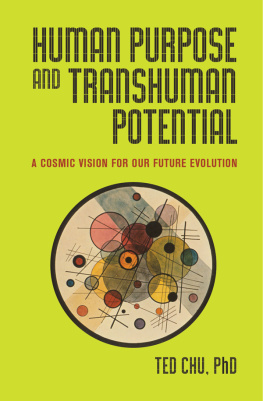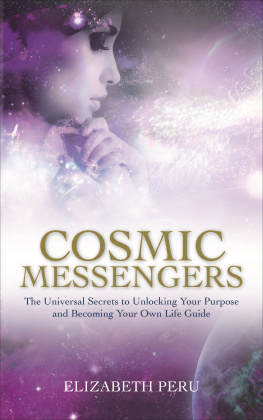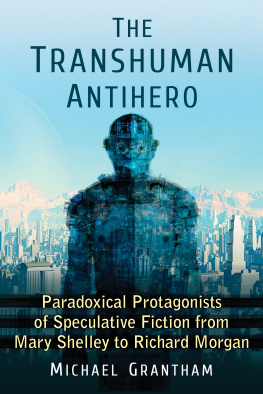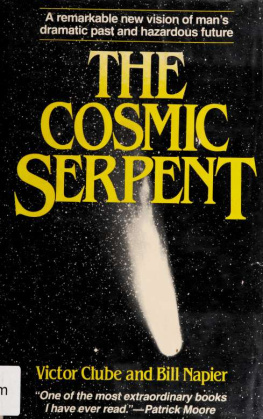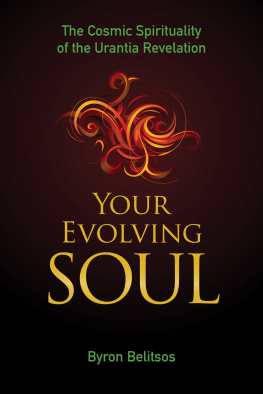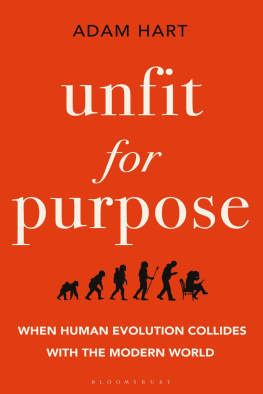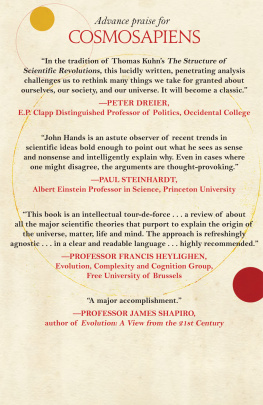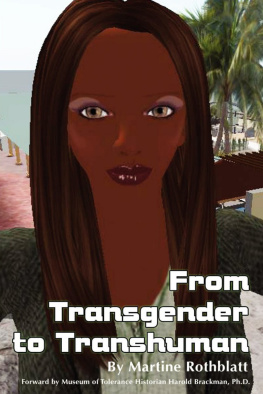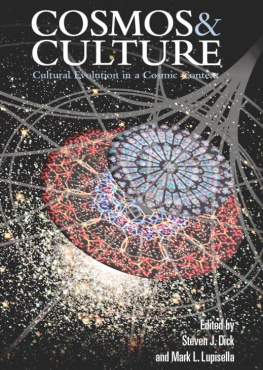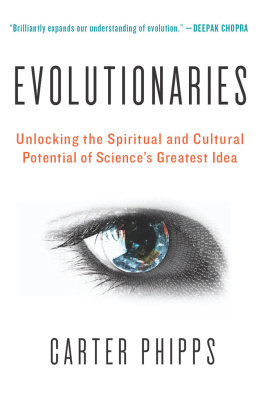Ted Chu - Human Purpose and Transhuman Potential: A Cosmic Vision of Our Future Evolution
Here you can read online Ted Chu - Human Purpose and Transhuman Potential: A Cosmic Vision of Our Future Evolution full text of the book (entire story) in english for free. Download pdf and epub, get meaning, cover and reviews about this ebook. year: 2014, publisher: Origin Press, genre: Romance novel. Description of the work, (preface) as well as reviews are available. Best literature library LitArk.com created for fans of good reading and offers a wide selection of genres:
Romance novel
Science fiction
Adventure
Detective
Science
History
Home and family
Prose
Art
Politics
Computer
Non-fiction
Religion
Business
Children
Humor
Choose a favorite category and find really read worthwhile books. Enjoy immersion in the world of imagination, feel the emotions of the characters or learn something new for yourself, make an fascinating discovery.
- Book:Human Purpose and Transhuman Potential: A Cosmic Vision of Our Future Evolution
- Author:
- Publisher:Origin Press
- Genre:
- Year:2014
- Rating:5 / 5
- Favourites:Add to favourites
- Your mark:
- 100
- 1
- 2
- 3
- 4
- 5
Human Purpose and Transhuman Potential: A Cosmic Vision of Our Future Evolution: summary, description and annotation
We offer to read an annotation, description, summary or preface (depends on what the author of the book "Human Purpose and Transhuman Potential: A Cosmic Vision of Our Future Evolution" wrote himself). If you haven't found the necessary information about the book — write in the comments, we will try to find it.
Ted Chu: author's other books
Who wrote Human Purpose and Transhuman Potential: A Cosmic Vision of Our Future Evolution? Find out the surname, the name of the author of the book and a list of all author's works by series.
Human Purpose and Transhuman Potential: A Cosmic Vision of Our Future Evolution — read online for free the complete book (whole text) full work
Below is the text of the book, divided by pages. System saving the place of the last page read, allows you to conveniently read the book "Human Purpose and Transhuman Potential: A Cosmic Vision of Our Future Evolution" online for free, without having to search again every time where you left off. Put a bookmark, and you can go to the page where you finished reading at any time.
Font size:
Interval:
Bookmark:
HUMAN PURPOSE AND TRANSHUMAN POTENTIAL
A Cosmic Vision for Our Future Evolution
By Ted Chu, PhD

Origin Press

Origin Press
PO Box 151117
San Rafael, CA 94915
www.OriginPress.org
Copyright 2014 by Ted Chu
Jacket design by Diane Rigoli (rigolicreative.com)
Interior design by Carla Green (studiocgraphics.com)
All rights reserved. This book is protected by copyright. No part of it may be reproduced, stored in a retrieval system, or transmitted in any form or by any means, electronic, mechanical, photocopying, recording, or otherwise without written permission from the author.
Library of Congress Control Number: 2013955162
ISBN: 978-1-57983-025-0
Cataloging-in-Publication Data:
Chu, Ted, 1963
Human purpose and transhuman potential : a cosmic vision for our future evolution / by Ted Chu, PhD.
pages cm
Includes bibliographical references and index.
LCCN 2013955162
ISBN 9781579830250
ISBN 9781579830236
ISBN 9781579830243
1. Philosophical anthropology. 2. Human beings. 3. Human evolution--Forecasting. I. Title.
| BD450.C48 2014 | 128 QBI13-2476 |
Printed in the United States of America
First printing December 2013
Part One
SETTING THE STAGE
Part Two
WISDOM, COSMIC VISION, AND HUMAN POTENTIAL
Part Three
HUMAN NATURE AND ITS LIMITATIONS
Part Four
CONSCIOUS EVOLUTION: ITS POWER AND IMPLICATIONS
Part Five
THE COSMIC FUTURE
First I would like to thank my wife, Amy Zhang, who for twenty-five years has tirelessly supported me in my professional development and philosophical research while pursuing her own software engineering career and taking care of our two children. She was my first audience when we walked under the stars during beautiful Michigan summer nights.
My understanding of Western wisdom was initiated fifteen years ago by two of my former GM colleagues, Tom Walton and Mike Whinihan, both Ph.D. economists with deep philosophical learning and penetrating insights into the Western intellectual tradition. Our weekly lunches were invaluable as I plunged into the research for this book.
I also want to thank Caroline Wang and her mother for providing me with daily delicious and spicy Hunan meals while I lived on the campus of Wayne State University full time to do research for several years.
Many scholars, leaders, and experts have influenced my thinking and shaped my worldview. Their names and works are scattered through the text and the bibliography, and I will not repeat them here. In addition, I am grateful to Jim Albrecht, Paul Ballew, Gerald Barney, Don Baron, Jim Boehm, James Chen, Denny Dellinger, Mike Digiovanni, Haiwei Dong, Bill Dunkelberg, Reindert Falkenburg, Jennifer Fang, Wafik Grais, Glenn Hefner, Wei Li, Weishuang Qu, Anne Smith, Ivan Szelenyi, Hong Wei, Ed Whitacre, Kippy Ye, Menghua Ye, and Qing Zhang for their unique contributions.
The book would not be possible without the essential guidance and input from my publisher Byron Belitsos and my editors Larry Boggs, Ellen Daly, and Elissa Rabellino. Thanks also to our book designers Carla Green and Diane Rigoli.
My parents and my primary and secondary school teachers instilled in me at an early age not only the desire to excel in academics but also the inspiration to contribute to society. My Chinese name () was coined by my grandfather; it literally means grand and complete, a wish I think about often.
Last and most important, I am grateful that I am alive, that the universe exists, and that humanity has continued to thrive despite our daily challenges. There is much that we can look forward to.
Professor of Theology Emeritus
Georgetown University
The worlds great wisdom traditions have always taught that the universe is the expression of a deep but impenetrable meaning. Their beliefs that the universe is here for a reason have given significance to peoples lives as well as incentive to moral action. The good life, accordingly, consists of adapting our lives to a transcendental wisdom stirring at the heart of all being.
Such a benign understanding of the cosmos, however, appeared in human history long before evolutionary biology, cosmology, and information technology came along. Adherents to the ancient visions knew nothing of natural selection and astrophysics. Nor could they have foreseen contemporary scientific expectations in the fields of genetics, robotics, nanotechnology, information science, artificial intelligence, and neuroscience. These new developments now invite us to consider how far emerging technologies may go in transforming human and other animal species, or in stretching our planets ecozoic fabric.
In the future, shall we reach a point where no clearly defined human natureat least as conceived by earlier generationsany longer exists? New discoveries related to the human genome will make it possible for applied science to alter radically our inherited bodily and behavioral inclinations, perhaps eventually transforming the entire human form into outcomes now unpredictable. The consequences of new scientific discoveries and their technological application are uncertain at present; but sensitive artists, dramatists, philosophers, ethicists, and social scientists are now envisaging a wide spectrum of possible results, many of them intriguing, others potentially monstrous.
Ted Chu is a pioneering visionary whose futurist concern deserves close attention. He is keenly aware that technological expertise is on the brink of reshaping our world and humanity dramatically. A continually more nuanced scientific understanding of the subatomic world, the manipulability of genes, the plasticity of brains, and the rules of evolutionary changeplus a host of other scientific insightsnow provides Homo faber with an almost irresistible opportunity to transform everything in our world radically. Those of us concerned about justice, liberation, human fulfillment, ecological integrity, spiritual existence, and the cosmic future need to read brave new books such as this one.
What implications do the emerging new technologies have for the future of the universe itself? Unlike our prescientific ancestors, we now realize that the world is still coming into being. The fourteen-billion-year-old cosmic drama recently exposed by astronomy, astrophysics, geology, biology, and other sciences is clearly far from finished. What role do humans have in determining the cosmic future?
The fourteen billion years that have transpired so far may turn out in the long run to have been only the dawn of the Big Bang universes eventual unfolding. Is it not the case that the newly emergent opportunities for technological change on Earth are now placing the universe itself on the verge of undergoing an explosive new chapter in its dramatic unfolding? It is now conceivable to many thoughtful people that the human period of evolution may eventually turn out to be a transitional chapter in cosmic history. How are we to address such a prospect? In the remote cosmic future, will human history appear to be anything more than an ephemeral crossing-over to more fascinating episodes in an enormously inventive cosmic narrative whose eventual playing-out is currently unimaginable? If you care about such questions, read this book.
Four billion years ago, with the arrival of life and biogenetic processes on Earth, the universe underwent an information explosion. More recently, with the emergence of complex brains and minds, at least on our planet, it erupted into thought. Then, with the arrival of social and political life, it began to undergo a cultural transformation, one that has included the invention of language, education, artistic expression, ethical aspiration, religious hope, and scientific inquiry. Currently, with the advent of transhumanist dreams, a distinctively new chapter in cosmic process is just beginning.
Font size:
Interval:
Bookmark:
Similar books «Human Purpose and Transhuman Potential: A Cosmic Vision of Our Future Evolution»
Look at similar books to Human Purpose and Transhuman Potential: A Cosmic Vision of Our Future Evolution. We have selected literature similar in name and meaning in the hope of providing readers with more options to find new, interesting, not yet read works.
Discussion, reviews of the book Human Purpose and Transhuman Potential: A Cosmic Vision of Our Future Evolution and just readers' own opinions. Leave your comments, write what you think about the work, its meaning or the main characters. Specify what exactly you liked and what you didn't like, and why you think so.

